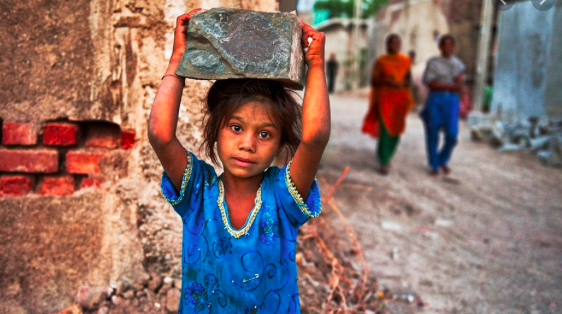The Scope of the Problem
According to the International Labour Organization (ILO), over 160 million children are engaged in child labor, with many exposed to hazardous conditions. These children work long hours in environments that are not only physically taxing but also emotionally and mentally damaging. Whether it’s in factories, fields, or households, the constant pressure, exploitation, and abuse can have devastating effects on their mental health.
Psychological Effects of Child Labor
Chronic Stress and Anxiety:
Child laborers are often burdened with responsibilities far beyond their years. They worry about meeting expectations, earning enough money for their families, and avoiding punishment from employers. This constant stress manifests as chronic anxiety, leading to long-term mental health issues.
Low Self-Esteem and Self-Worth:
Many child laborers are treated as commodities rather than individuals. They are often subjected to verbal abuse, neglect, and humiliation, which erodes their self-esteem. Over time, they internalize the belief that they are not worthy of love, respect, or success.
Trauma and PTSD:
Children exposed to dangerous or abusive working conditions are at high risk of trauma. Physical abuse, sexual exploitation, and witnessing violence can leave lasting scars, leading to post-traumatic stress disorder (PTSD). These children often relive traumatic events through nightmares, flashbacks, and heightened vigilance.
Depression and Hopelessness:
The monotonous and grueling nature of child labor, combined with a lack of opportunity for escape, fosters feelings of hopelessness. Many child laborers develop depression, losing their sense of purpose and the will to dream of a better future.
Cognitive Development Delays:
A lack of education, coupled with the mental strain of labor, affects cognitive development. These children miss out on critical learning periods, leading to difficulties in problem-solving, decision-making, and emotional regulation later in life.
Long-Term Consequences:
The psychological damage of child labor doesn’t end with childhood. Many survivors of child labor struggle with mental health issues well into adulthood. Their ability to form healthy relationships, hold stable jobs, and lead fulfilling lives is often compromised. This perpetuates cycles of poverty and exploitation, making it harder for future generations to break free.
Breaking the Cycle: Solutions for Change
Awareness and Advocacy:
Raising awareness about the psychological impact of child labor is crucial. Governments, NGOs, and communities must prioritize mental health alongside physical well-being in their campaigns and interventions.
Education and Rehabilitation:
Providing rescued child laborers with access to education and psychosocial support is essential for their recovery. Schools and rehabilitation centers must include counseling services to help children process their experiences and rebuild their confidence.
Economic Support for Families:
Poverty is a primary driver of child labor. Offering financial assistance, vocational training, and livelihood programs to families can reduce the economic pressure that forces children into labor.
Strict Enforcement of Laws:
Enforcing laws against child labor is critical to protecting vulnerable children. Governments must ensure that employers exploiting children face legal consequences and that rescued children are given the resources to rebuild their lives.
Community Involvement:
Empowering communities to identify and report cases of child labor can make a significant difference. Local leaders, educators, and citizens must work together to create a safety net for at-risk children.
The psychological impact of child labor is a hidden crisis that demands urgent attention. Every child deserves a safe, nurturing environment where they can grow, learn, and dream. Addressing the mental health consequences of child labor is not just an act of compassion—it is an investment in the future of society.
By breaking the chains of exploitation and providing holistic care, we can help children heal and create a world where no child is robbed of their childhood. Together, we can turn hidden crises into visible victories.

